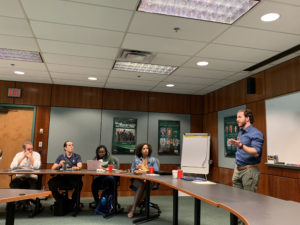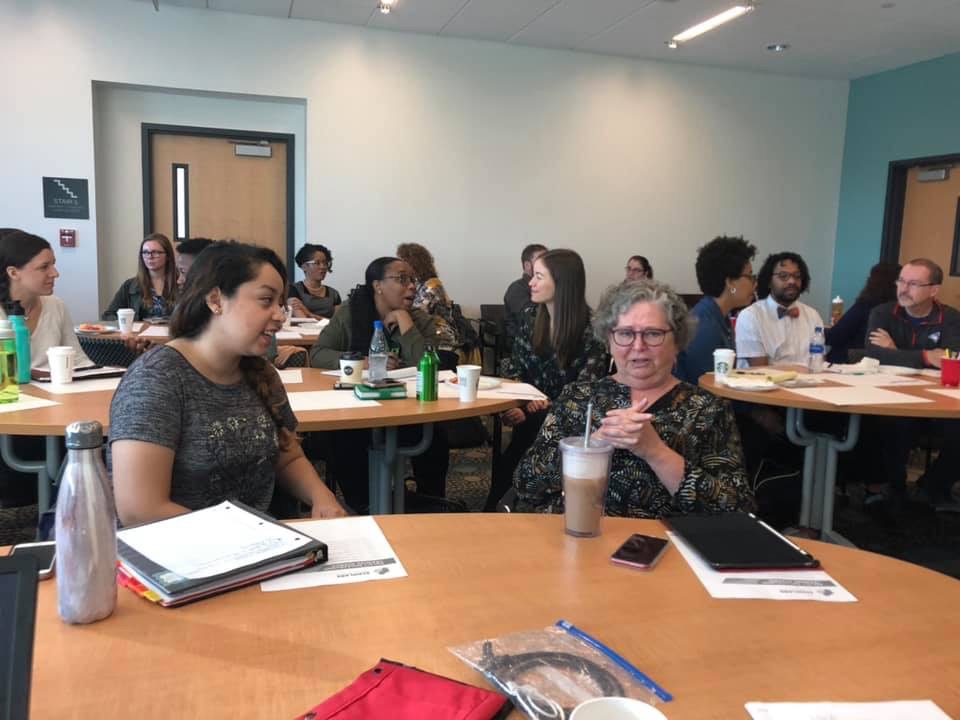Science from the Inside Out: Science Communication and Science Policy
By Maya Carrasquillo
Strong Coasts prioritizes community engaged research, but researchers and academics often struggle to translate their work to broader audiences outside of academia, and rarely are we trained on how to do this effectively. On April 5th, 2019, the Strong Coasts cohort hosted a Science Communication and Science Policy workshop to provide an opportunity for the USF community to learn science communication strategies to various audiences and also to learn about opportunities to engage in policy spheres.

The workshop started with a presentation by Dr. Drew Story who currently serves as a Congressional Fellow in the office of Sen. Chris Coons (DE) working on the energy and environment. Based on his diverse experiences as a science teacher, academic researcher, and now congressional staffer, Drew was able to offer a well-informed and practiced perspective of how to communicate science, including nuggets like making our communication memorable, meaningful, and miniature (short and sweet). Where we often fall short as researchers, is starting with the ‘what and how’ not the ‘why and who’ of our research. Why does our work matter? Why is it important? Who does our research impact? Who can benefit from knowing and applying this work? As researchers we’re trained to start with the details to make our case, but depending on the audience, whether it’s K-12 educators and students, policymakers or our family, the why is more important than the what.
One of the key points that resonated with me most from this session was that all of our research has a ‘why’ and it’s our responsibility to not only understand what that is, but to be able to communicate that driver to any audience. That is our key hook to making sure our message doesn’t get lost in the weeds when we strive to communicate with any audience.
Following this session, we also hosted a panel discussion featuring several AAAS Science, Technology and Policy Fellows (all USF alumni), who currently work in varying industries from water utility, to academia and policy. Each of the panelists shared their experiences of successfully applying to the AAAS Fellowship. They then discussed the ways in which they use the transferrable skills of engaging in science policy in their current roles for communication, and networking. They stressed the imp\
I think for each of us, this skillset of adaptability is critical to not only our successes as researchers, and communicators of that research, but also as our careers transform, there is great value in having the ability to shift and adjust as necessary to still reach a desired yet sometimes unexpected outcome. Whether that adjustment is in approach, or expanding partnerships, as researchers we’ve grown accustomed to making changes to still achieve a desired result, and to not let those changes hinder our progress. Connecting both segments from the day, our ability to know why we do what we do and stay rooted in that core ‘why’ of research, yet maintaining flexibility to adjust strategies towards achieving that ‘why’ is ultimately what will make us effective scientists and communicators, striving for a broader impact.
This was an excellent introduction to this topic and as we move forward in our Strong Coasts program, we are committed as a cohort to continue dialoguing on similar topics to ensure that we are not only being trained as productive scientists, but contributing and thoughtful global citizens in the work that we strive to do within and for communities!
About the Author. Maya Elizabeth Carrasquillo is an Environmental Engineering PhD student at the University of South Florida. Her research interests are at the intersection of water, sustainability, and social justice. Her current research looks at stormwater management through an environmental justice lens to develop a community-based framework of sustainability, promoting more equitable development of stormwater best management practices in coastal African American communities. Her work includes community partnerships in East Tampa, Florida and Bayview-Hunters Point in San Francisco, California. Maya holds a B.S. in Environmental Engineering with a minor in History from the Georgia Institute of Technology. Maya is also a recipient of the National GEM Fellowship, the McKnight Doctoral Fellowship and the Alfred P. Sloan Graduate Minority Scholarship Program, and has industry experience with Intel Corporation working on environmental treatment systems and diversity and inclusion projects.
STRONG COASTS is supported by a National Science Foundation Collaborative Research Traineeship (NRT) award (#1735320) led by the University of South Florida (USF) and the University of the Virgin Islands (UVI) to develop a community-engaged training and research program in systems thinking to better manage complex and interconnected food, energy, and water systems in coastal locations. The views expressed here do not reflect the views of the National Science Foundation.

